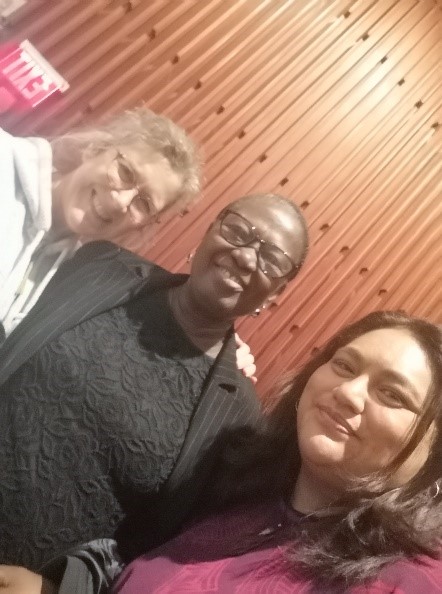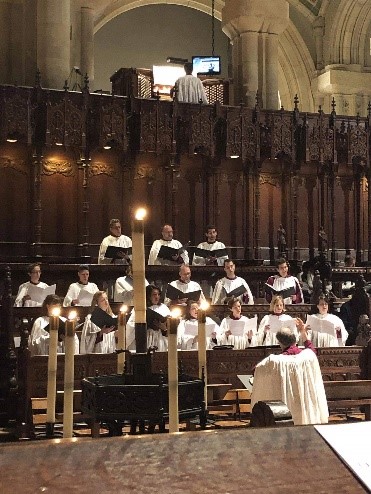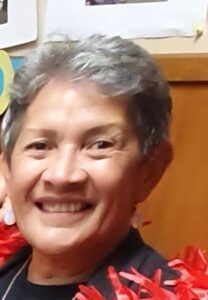How can we be more intentional in connecting globally to progress local issues? What are the opportunities to grow the influence and voice of the world wide Anglican Communion on human rights issues? Is there a need for our Church here in Aotearoa, New Zealand and Polynesia to be stronger advocates at Government/Parliamentary level? How in my role can I encourage young women leaders to build relationships, to network and to have a global perspective, inclusive of the United Nations.
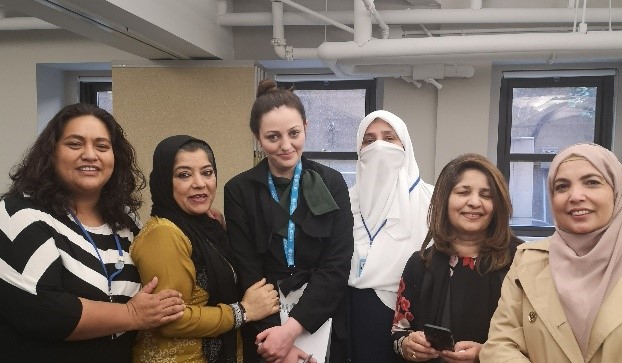
Ruihana Paenga attended the United Nations Commission on the Status of Women 63rd Session in New York .
She is the National Youth Coordinator, Te Pīhopatanga o Aotearoa
Psalm 46: God is our refuge when we are in trouble and we need not fear though the earth shakes and the mountains fall for the Lord of Heaven is here.
From 8-22 March 2019, I had the privilege of attending the 63rd session of the Commission on the Status of Women at the United Nations in New York City. The theme for UNCSW63 was Social Protection Systems Access to Public Services and Sustainable Infrastructure. The event provided exposure to a wide range of human rights issues focusing on gender equality and the empowerment of women and girls. Key takeaways have been how to be more intentional in connecting globally to progress local issues, opportunities to grow the influence and voice of the world wide Anglican Communion on human rights issues and the need for our Church here in Aotearoa, New Zealand and Polynesia to be stronger advocates at Government/Parliamentary level.
Anglican Communion Delegation
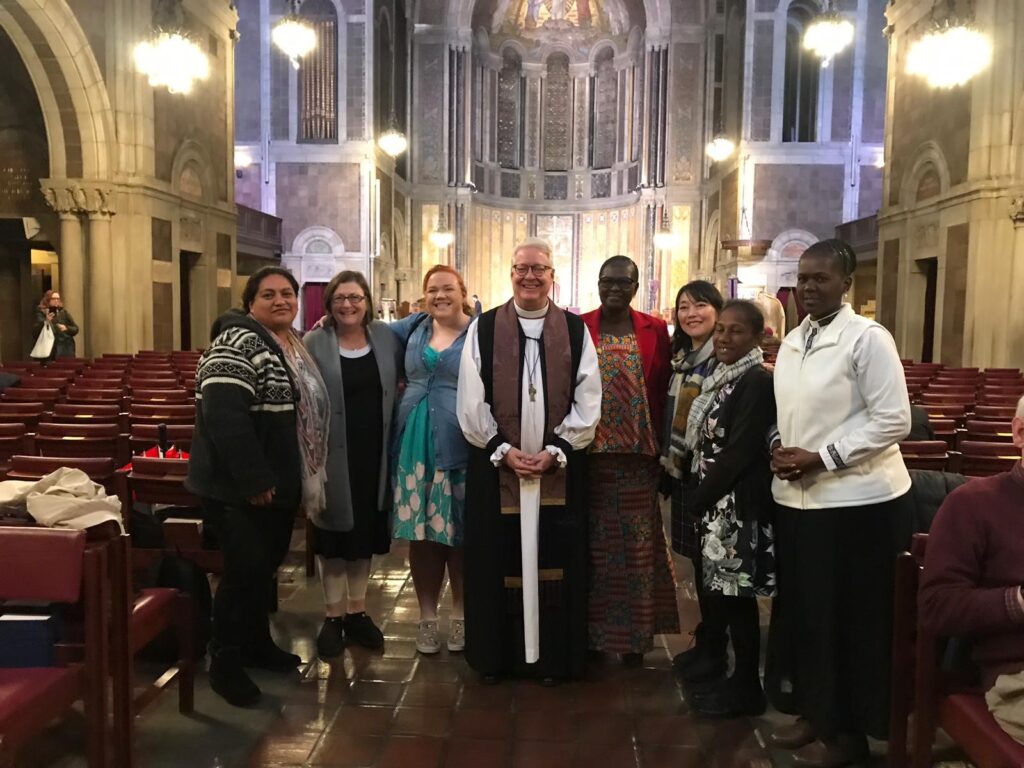
This was the first time the Anglican Communion Office strategically identified a small group of delegates, aimed at building bonds across provinces, building a stronger Anglican Communion presence and voice at the United Nations. I would like to acknowledge the Anglican Women’s Studies Centre (AWSC) Council, and the Primates for supporting my nomination to attending CSW. It was a once in a lifetime opportunity which I pray has increased benefits for people around the world.
The Anglican Communion Office appointed Jack Palmer as Permanent Representative to the United Nations in 2018, and Jillian Abballe as Advocacy Officer and Head of Office for ACO at the UN. It was evident that a new approach is being taken by the Anglican Communion in terms of preparedness, participation, collegiality between the Anglican, Episcopal churches and Ecumenical Women. Our team met to discuss our approach in late 2018, therefore some bonds had been formed. I hope that maintaining and fine tuning this approach will ensure our unique voice and priorities are increasingly being heard and influencing the UN agreed conclusions through our various member state countries. Additionally, we can support our fellow sisters, recognizing that provinces have different contextual challenges, and so the opportunity to network is extremely important for the causes we are bringing, and provides opportunities to work together beyond CSW.
Talking Points
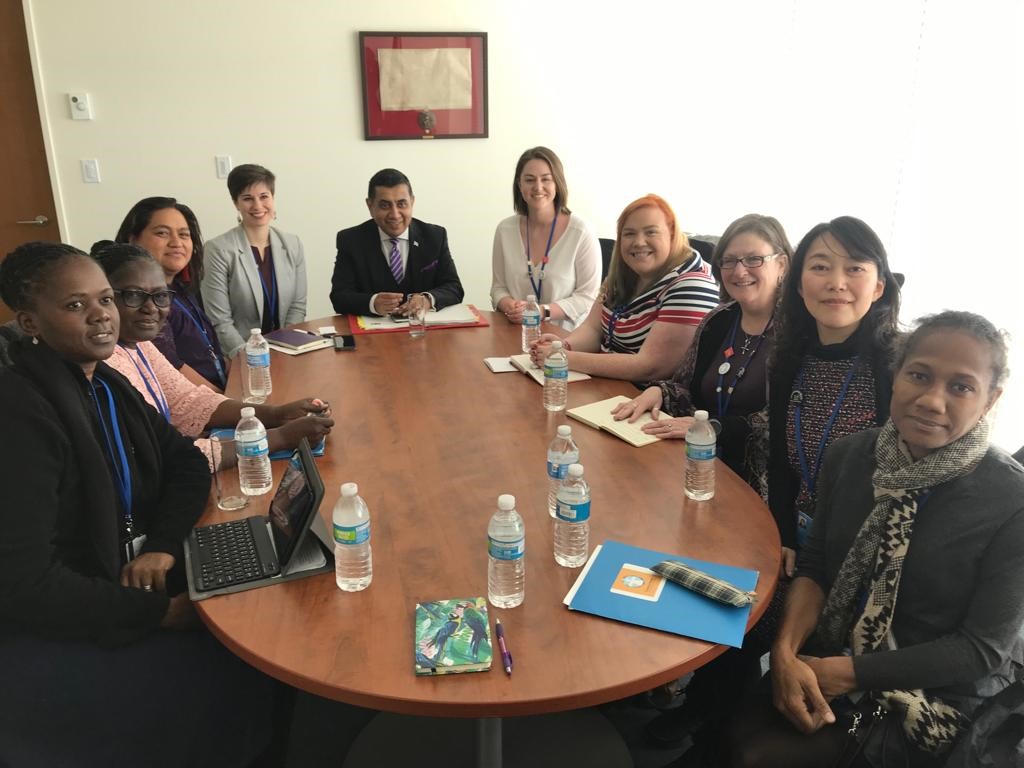
| Our full delegation including ACO officers Jillian Abballe & Rachael Fraser either side of Lord Tariq Ahmen of Wimbledon Member of Parliament for UK |
The Anglican Communion is the world’s third largest Christian Communion. It is comprised of 40 provinces across over 165 countries representing 85 million people, all working in various capacities and ministries to transform unjust structures of society, challenge violence, pursue peace and reconciliation, safeguard the integrity of creation and act in loving service.
The Anglican Communion seeks to uphold just relationships between women and men as a reflection of our Christian belief that women and men are equally made in the divine image, and seeks to encourage and support our church leaders to model just relationships, promote gender equality, and lead their people in challenging and ending gender based violence in all forms. It is in this spirit that the Anglican Communion has engaged in the Commission on the Status of Women for more than 20 years, bringing women from all across the Communion to be in fellowship and advocate with one another.
The United Nations
Jeremiah 22:3 This is what the Lord says: Do what is just and right. Rescue from the hand of the oppressor the one who has been robbed. Do no wrong or violence to the foreigner, the fatherless or the widow, and do not shed innocent blood in this place.
As an NGO (non-governmental organisation) the Anglican Communion is a member of the United Nations via the Anglican Consultative Council in consultative status with the UN Economic and Social Council (ECOSOC) since 1985. ACC is the legislative and policy-making arm of the worldwide Anglican Communion’s 85 million members. ECOSOC provides accreditation and a platform for engagement between NGOs and UN member states (country). A total of 12,000 attendees of which 9000 were NGO delegates, and 3000 member state delegates attended CSW63.
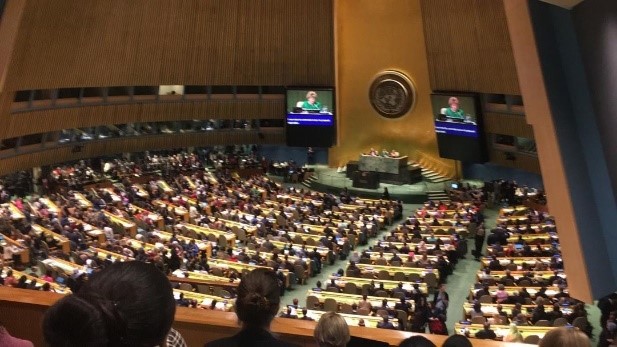
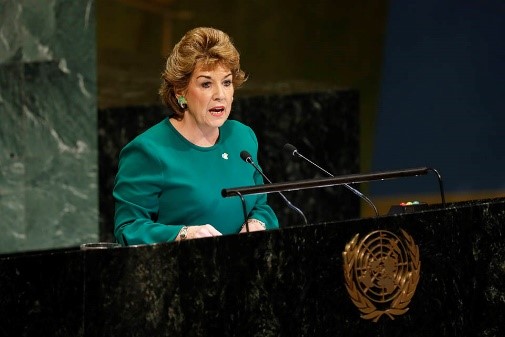
Right is a picture of the opening session of the United Nations. Geraldine Byrne Nason (Ireland) the Chairperson of the UNCSW speaks about an 11 year girl that says she wants to be President not of Ireland but President of the World, “while at the moment it is a job that has not yet been invented, who’s to say it won’t exist in 2063.” Imagine if that President of the world is a woman who comes to power by leading with integrity, empathy and fairness. I am ready to imagine that world, if I am not I shouldn’t be up here.”
Globally there has been a pushback on gender equality, collectively we haven’t yet succeeded in making sure that women are wherever decisions are being made, the numbers show that “in this UN of 193 Member States, only 46 (21%) of governments decided that a woman should be their Permanent Representative. Globally only 1 out of 4 parliamentarians (23%) are woman and heads of Government 5% right now there are 130 million girls out of school. Of the top 3000 companies the proportion of women to men on boards is less than 20%. It is estimated that it will take 217 years to reach parity between men and women in pay and employment opportunities.”
These sentiments were echoed during the conference by NGO delegates and diplomats such as Mrs Lopa Banerjee, Chief of Civil Society at UN Women, who spoke at the Ecumenical Women’s orientation. Lopa noted priority needs to be placed on social protection, public services, and infrastructure. Governments engage with its people through these key services however no Government is providing coordinated action across the three areas. Structural barriers that promote and facilitate poverty, segregation, inhumanity, pay disparity and gender inequality are rampant. Unpaid care work is disproportionately done by women, infrastructure design is male centric with female needs on the periphery. Women must have affordable and universal access to services such as water, sanitation, power, communication and transportation.
CSW63 Timetable
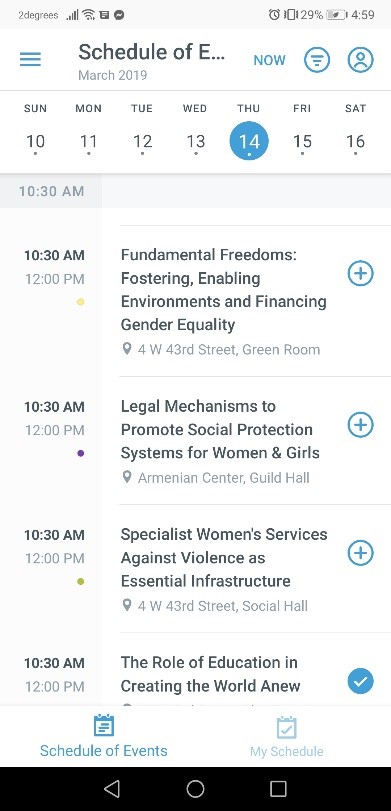
There were over 200 workshops and events to attend in the two weeks of CSW63. Side Events are hosted by Member States and Parallel Events hosted by NGO’s. A recommended program was provided by our Anglican delegation advisors, which began with worship at the Christian Chapel UN, and included faith focused workshops, team debriefs and advocacy opportunities. Pictured right is a screenshot of the CSW63 App Guidebook, the go-to for managing your schedule. With approximately 30-40 events per day, 8-10 events across four time slots, being organized and having an awareness of the multiple processes occurring at the same time is a necessity.
I have summarized some of the workshops I attended in the following two pages.
Tackling the Gender Pay Gap – Hosted by Switzerland, supported by New Zealand, Iceland and Papua New Guinea and UN Women
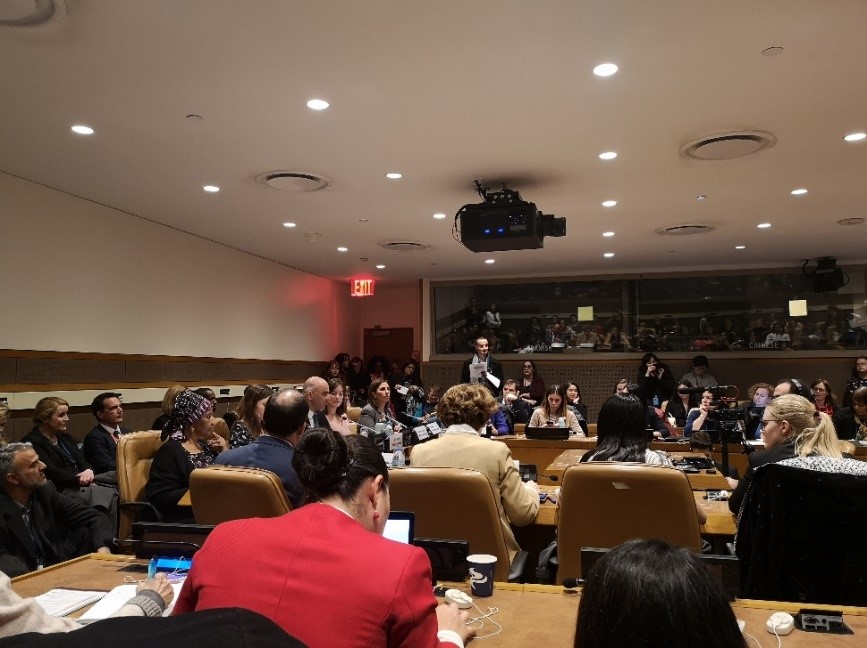
Gender representation has been on UN developed countries’ priority list and it is good to see Governments of countries like Sweden, Canada, Iceland and our own New Zealand make concerted efforts to progress gender pay gap inequalities through Acts of legislation. For example, Sweden’s Gender Equality Act requires companies with 100 employees and over to review their pay practices as a requirement. Minister of Women’s Affairs, Hon Julie Anne Genter, said New Zealand’s gender pay gap has reduced from 12% to around 9%. However, this was not the case for indigenous and minority women whereby the pay gap for Pacific women was still up at 21%. I found it very confronting, and it began sinking in that I was in a position of privilege that my rights extend to equality of income with a pākeha man, with the same qualifications and expertise as myself and every women like me. I had not given that much thought up until then and it made realise how much more I could support myself, my family and my community.
I was enlightened to learn that the International Labour Organisaton,(ILO), a 100 year old organization, has a 2030 goal to achieve full and productive employment and decent work for all women and men, including for young people and persons with disabilities, and equal pay for work of equal value. Collaborations such as EPIC (Equal Pay International Coalition) exist to reduce the gender pay gap and make equal pay for work of equal value a reality across all countries and sectors. Led by the ILO, UN Women and OECD, the coalition engages with governments, employers, workers and their organizations, the private sector, civil society and academia to take concrete steps to accelerate the closing of the gender pay gap and the achievement of pay equity. My mind harked back to the UNCSW opening statement. How authentic are these statements, or are they just nice words to be adjusted as the time frames elapse? As mentioned by Lopa Banerjee, sluggish commitment, incremental action has led to regression. Achieving gender balance, empowering women and girls takes time – yes– but above all it takes conviction and political courage.
How does our mission as a Church evolve to prioritize improving the quality of life of our members, particularly for women and girls and indeed Aotearoa? And are we giving due consideration to all our brothers and sisters in the communion and, if so, are we reflecting upon the global commitments we are signed up to and providing for them?
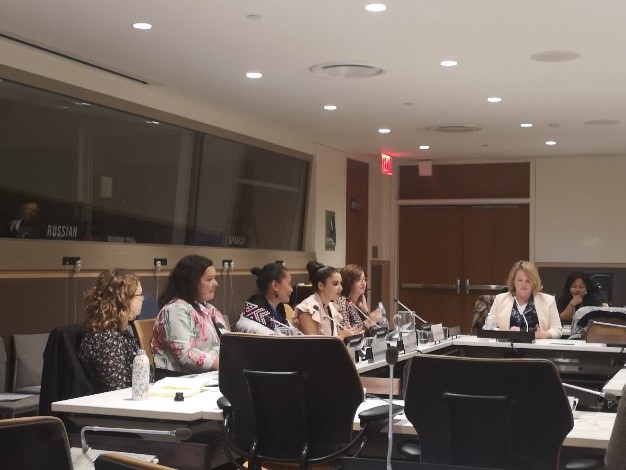
Pictured right is a workshop titled Access to STEM Education and Infrastructure- Careers for Women & Girls in NZ and Pacific. Twenty year old Alexia Hilbertidou, CEO of her company Girlboss speaks alongside senior executives of Ernst & Young, BECA infrastructure and Ministry of Womens Affairs about how we can support young women into the sciences and infrastructure development fields, increasing the number of female executives in these fields.

Equal opportunity access to social protection systems was discussed from a LGBTI+ perspective in the workshop pictured left on Non-Binary Identities and Social Security Systems Challenges and Opportunities. Promoting equal rights for people engaged in planned and unplanned parenting, advocating for transgender homeless lobbying legislators to discuss passing Acts such as the Gender Expression Non Discrimination Act and building academic discourse on minority cultures and those who identify as non-binary.
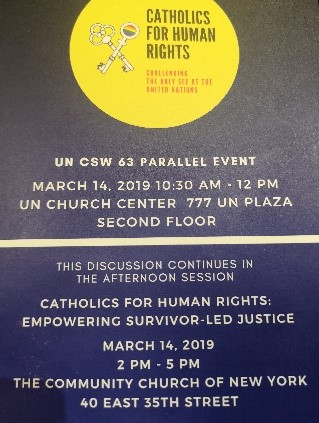
A parallel event organised by Catholics for Choice opened my eyes to the position of the Holy See at the United Nations. The plight of Catholics who disagree with the permanent observer status of the Holy See exposing the nature of their strategic ties with certain nations to preserve their Humanae Vitae beliefs on contraception and sexuality. This was an informative and revealing session of religion, state, power and influence and I became further engaged in my purpose as a faith representative, fundamental human rights versus culture experience and theological interpretation.
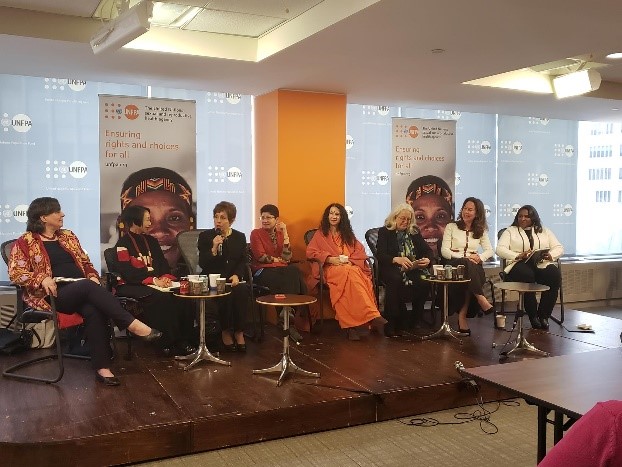
Pictured right is an interfaith dialogue of women in leadership from right Rev Dionne Boissere UN and CSW chaplain from the Baptist church, Cannon Sarah Snyder reconciliation advisor to the Arch Bishop of Canterbury, Grove Harris Wiccan priest and eco justice advocate, Sadvhi Bhagawati Saraswati an American born spiritual leader in Ashram faith who has lived in Rishikesh India for 20 years and current secretary general for the WASH a world first, religious leaders alliance on Water, Sanitation and Hygiene. Event moderator, muslim academic and senior advisor on culture and social development at UN Population Fund Dr Azza Karam. Joyce Dubensky, Audrey Kitagawa and Katherine Marshall are also pictured.
The workshops pictured left from top are Through Sexual Violence Prevention Network to Empower Women and Girls, and discourse from lawyers and educators from Ghana, Mexico and Taiwan on the types of measures they are implementing to educate and prevent sexual against girls and women.
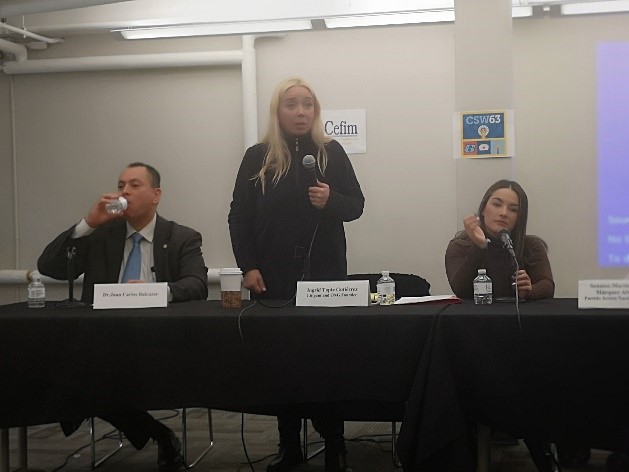
The workshop in the second picture was misleadingly titled Governance for Women but was a profamily, prolife workshop, organised by Red Familia a collective of NGO’s operating in Mexico. While initially I thought it to be an anti-abortion discussion, I was surprised by the speaker pictured Ingrid Tapia Gutierrez who spoke passionately about the state of corruption in Mexico between corporates and Governments and the actual injustices to the rights of mothers to care and be supported to care for their children. It took me back to our own people and how interventions might begin with a positive intention, but can do more damage when corruption and ignorance infiltrates the process. While at CSW the horrific news of the Christchurch terror attacks reached New York and the UN. Many expressions of condolences and empathy were shared, the New Zealand delegation in particular came together to support each other and the EW morning worship remembered those killed and offered prayers to our nation. One workshop I attended hosted by the International Muslim Womens Union highlighted to me that our values and priorties are similar, and that despite this tragedy, we will continue to champion our kaupapa. Leadership by women in rural communities to increase sustainable development participation needs to be identifed. Mana wahine needs to be heard and provided for.
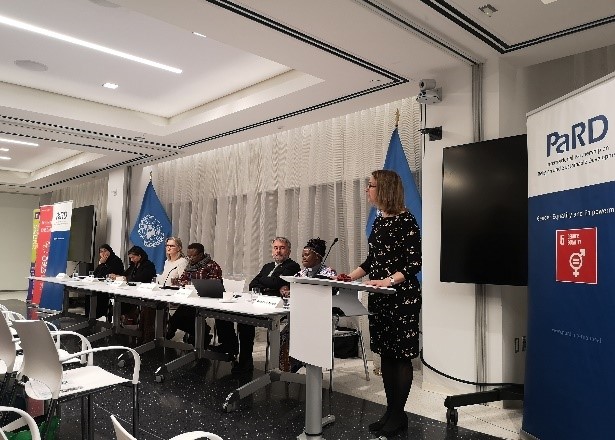
The final picture is a roundtable discussion organised by PaRD International Partnership on Religion and Sustainable Development on Faith Feminism and Human Rights Frameworks. Suffice to say the number of international faith-based collegially operating groups aimed at gender equality, human rights, environmental health and sustainable economies is huge to get your head around. But important to identify where should be looking to build opportunities and partnerships.
Throughout CSW I attended the two day EW orientation, 5 Side events, 10 Parallel events, and other meetings like New Zealand delegation debriefs (6), Anglican delegation debriefs (7 and one Retreat), Asia Pacific Caucus (2), Episcopal Church and Anglican Church combined dinners (3), Ecumenical Women advocacy dinners (2). I made some very good friends from across the church and possible networking opportunities for future projects within the communion. Pictured below are the Anglican and Episcopal delegation hosted by AWE in its final year of operation.
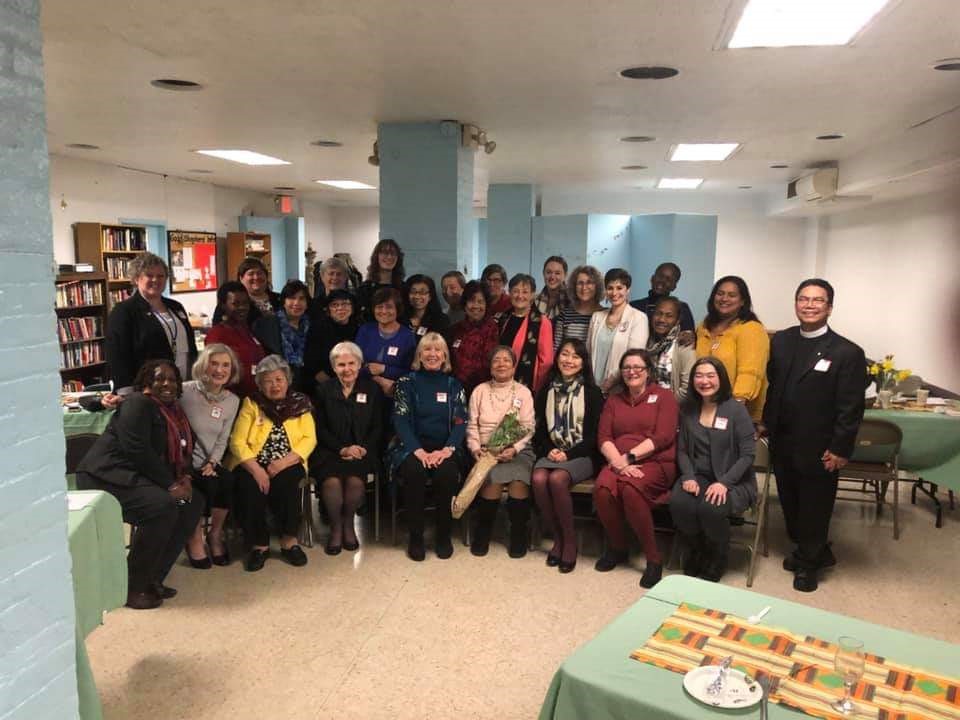
Agreed Conclusions and the New Zealand Delegation
Jeremiah 8:22 Is there no balm in Gilead, is there no physician there? Why then is there no healing for the wound of my people.
A key outcome of the UNCSW is the Agreed Conclusions document, which contain an analysis of the priority theme and a set of concrete recommendations for governments, inter-governmental bodies, other institutions, civil society actors and other relevant stakeholders to be implemented at the international, national, regional and local level. Agreed Conclusions are negotiated behind closed doors by member states (without NGO presence), and advocates line the hallways waiting for a break in negotiations to lobby Government reps, or the case of the NZ delegation send a string of correspondence via Whats App.
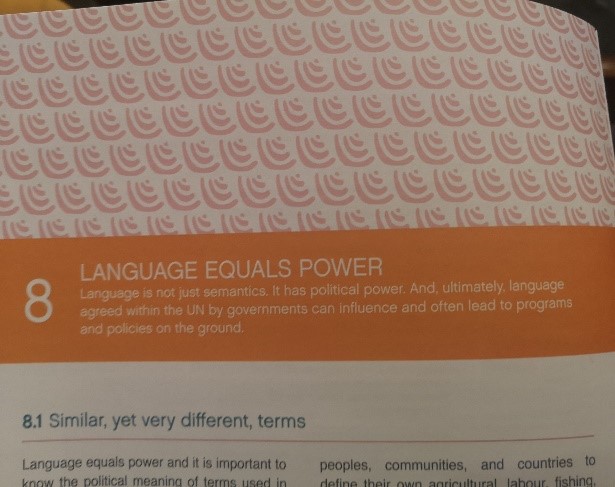
Negotiating Agreed Conclusions is a political process which, as a first timer to CSW, I struggled to understand, despite being updated daily at team briefings. Language is a key skill required in both advocacy and negotiating at the UN and can lead to programs and policies on the ground.
At a deeper glance, negotiating Agreed Conclusions reveals where New Zealand ranks in terms of its own grouping Western European and Others, and how assertive our Government is being on issues that the Anglican Church in Aotearoa and New Zealand and indeed civil society in New Zealand have identified as advocacy points.
The NZ NGO delegation was a group of 30 women including Prue Kapua president of Maori Womens Welfare League, Caroline Herewini Womens Refuge, Pacific Womens Watch, faith based organisations Presbyterian, Baptist and Salvation Army churches. Much of the advocating on issues, that the church believes needs traction or voice needs to be done in coordination with other NGOs and prior to CSW to be helpful and more impactful in negotiating the agreed conclusions.
Key recommendations from the final conclusions are listed below or on this website: http://www.unwomen.org/en/news/stories/2019/3/press-release-csw-63-delivers-roadmap-on-ensuring-womens-social-protection
- Invest in social protection, public services and sustainable infrastructure to support the productivity of women’s work, including in the informal economy;
- Ensure that progress in women’s access to social protection, public services and sustainable infrastructure is not undermined by budget cuts and austerity measures, and levels of protection previously achieved are not reversed;
- Build on multilateral commitments to gender equality, including the Convention on the Rights of Persons with Disabilities and the ILO Social Protection Floors Recommendation, 2012 (No. 202), to strengthen access to social protection, public services and infrastructure for all women and girls;
- Recognize, reduce and redistribute unpaid care and domestic work by ensuring access to social protection for unpaid caregivers of all ages, including coverage for health care and pensions;
- Scale up investment in quality public care services that are affordable and gender-responsive;
- Identify and remove barriers to women’s and girls’ access to public services, such as physical distance, lack of information and decision-making power, stigma and discrimination;
- Guarantee the availability of safe and affordable drinking water and sanitation, including for menstrual hygiene, in homes, schools, refugee camps and other public places;
- Ensure that transport policies and planning are sustainable, accessible, affordable, safe and gender-responsive, taking into account the different needs of women and men, and adapted to be used by persons with disabilities and older persons;
- Promote the full and equal participation and leadership of women and women’s organizations in policy dialogues and decision-making relating to social protection systems, public services and sustainable infrastructure;
- Strongly condemn the impunity and lack of accountability rooted in historical and structural inequality that accompanies pervasive violence against women.
These are global standards which we as a country and a church have aligned ourselves to. What does re-committing ourselves to these standards look like, provincially as Anglican Women, regionally in diocese and Amorangi and locally in parishes and whanau?
Conclusions
Attending the UN has been a HUGE learning curve which I have thoroughly enjoyed and give thanks to God for. I look forward to the ongoing connections and opportunities that arise from it. We know that gender based inequality and inequality of marginalized groupings exists in Aotearoa, New Zealand and Polynesia.
The need for NGOs focused on empowering women and girls is high, the commitment by our women’s groups in the church, AWSC, Kahui Wahine, Mothers Union, and those committed to gender equality needs refocusing. The academic critique based on our five-fold mission statement and our contextual uniqueness in the Pacific and as a Three Tikanga Church needs to be told. The priorities and policies within the church structure must be contextually relevant and representative of improving the world. We have the opportunity to be spiritual and ethical leaders as a communion. UNCSW64 will focus on a comprehensive review of key conventions as 2020 sees the culmination of;
- 10 years since the establishment of UN Women
- 5 years of the Sustainable Development Goals SDGs, and 10 years to the 2030 Agenda
- 25 years of the Beijing Platform for Action
- 41 years of CEDAW (Convention on the Elimination of Discrimination Against Women)
While the statistics are not all positive globally there is still a lot of hope present at CSW63: grassroots organisations are doing some fantastic works of humanity. Groups such as WASH, Salvation Army’s work with Syrian Refugees, Indigenous Climate Action, House of Sarah “Violence is a Sin” inter-faith partnership, and any many other good works. I saw a lot of potential for our Province to be better organized for 2030 Sustainable Development Agenda. Finally, I am considering how in my role I can encourage young women leaders to build relationships, network and have a global perspective, inclusive of the United Nations.
